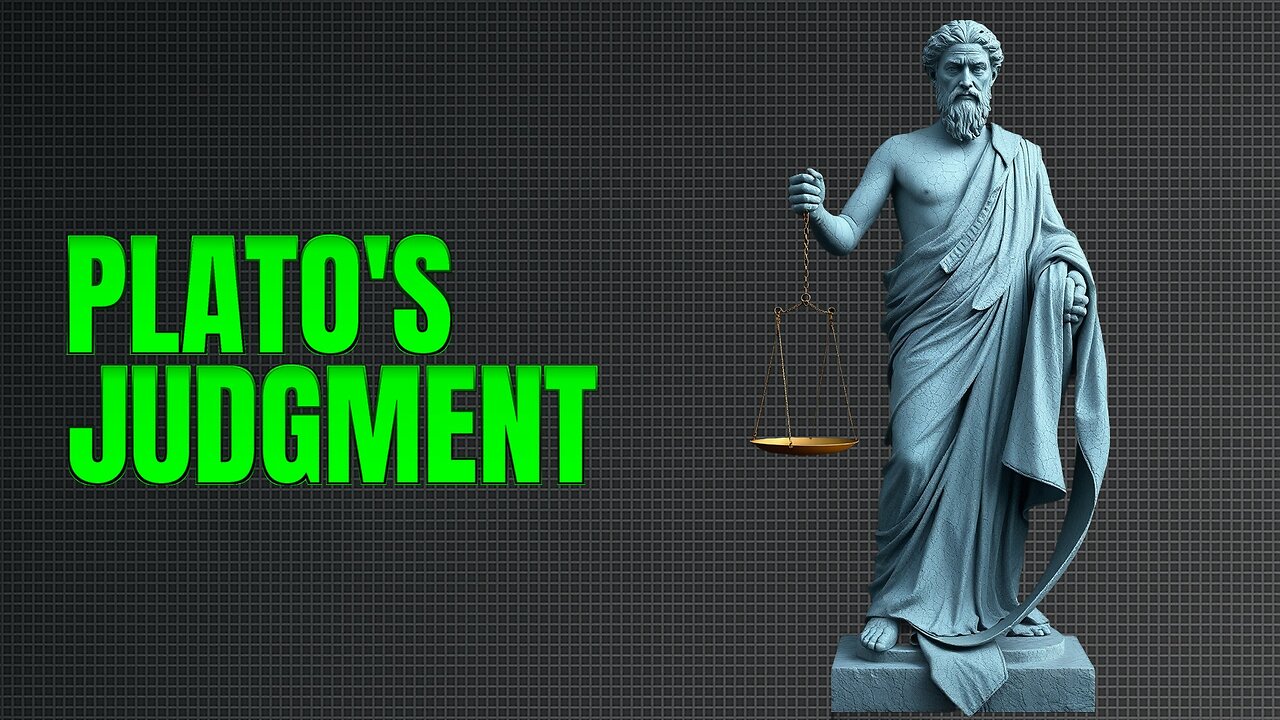Premium Only Content

How plato would judge you (based on his philosophy) | Stoic Philosophy
Title: How Plato would judge you (based on his philosophy) | Stoic Philosophy
Description:
Plato, one of the foundational figures in Western philosophy, would likely judge an individual based on the principles outlined in his extensive philosophical works. While Plato's philosophy is distinct from Stoicism, understanding his criteria can provide valuable insights into personal character and ethical standing.
Firstly, Plato believed in the concept of the ideal Forms, which are perfect and eternal archetypes of things in the material world. He would judge a person based on their alignment with these Forms, particularly the Form of the Good. The Good is the ultimate principle of morality and knowledge. Plato would assess whether an individual strives for the Good in their actions and thoughts, seeking justice, wisdom, and courage—the cardinal virtues.
Secondly, Plato’s concept of the soul plays a crucial role in his judgment. He saw the soul as composed of three parts: reason, spirit, and appetite. A just person, according to Plato, is one whose reason governs the other parts of the soul, ensuring a harmonious and balanced life. He would evaluate how well a person controls their desires and emotions through rational thinking.
Thirdly, Plato’s allegory of the cave illustrates his view on knowledge and reality. He would judge a person based on their pursuit of true knowledge and enlightenment. Those who seek to understand the ultimate reality beyond the illusions of the material world would be deemed wiser and more virtuous.
Fourthly, Plato’s views on justice, as elaborated in "The Republic," are central to his philosophy. He would judge a person based on their commitment to justice, not just in personal actions but also in their contribution to societal harmony. A just person, for Plato, is one who recognizes their role in society and fulfills it with integrity.
Finally, Plato’s concept of the philosopher-king, a ruler who possesses wisdom and virtue, would also influence his judgment. He would look for qualities of wisdom, leadership, and ethical behavior in a person, especially if they hold positions of power or influence.
In contrast, Stoic philosophy, while sharing some commonalities with Plato’s ideas, emphasizes living in accordance with nature and accepting that one cannot control external events, only how one responds to them. Stoicism focuses on virtues such as self-control, courage, justice, and wisdom, aligning with Plato’s ideals but with a stronger emphasis on personal resilience and acceptance.
In summary, Plato would judge an individual based on their pursuit of the Good, the harmony of their soul, their quest for true knowledge, their commitment to justice, and their embodiment of wisdom and virtue. These criteria provide a comprehensive framework for evaluating personal character and ethical behavior.
Tags:
Plato's philosophy, The Good, soul harmony, allegory of the cave, justice in society, philosopher-king, Stoic philosophy, personal virtue, ethical behavior, pursuit of knowledge
-
 16:18
16:18
Chris Harden
2 days agoCharlie Kirk Utah Reaction | What Locals Are Saying
4K3 -
 50:47
50:47
ChurchandState1776
18 hours agoFree speech is not negotiable with Sam Anthony
2.23K2 -
 LIVE
LIVE
Total Horse Channel
19 hours agoAMHA 2025 9/20
1,102 watching -
 16:59
16:59
Chris From The 740
18 hours ago $2.43 earnedIs Bigger Better? - The Gideon Optics Mediator 2 Is Here!
16K1 -
 7:58
7:58
Blackstone Griddles
15 hours agoTennessee Mountain Burgers on the Blackstone Griddle
13.3K2 -
 43:32
43:32
NAG Daily
16 hours agoThe Rezendes Rundown Ep. 17 - Epstein's Birthday Book
14.1K6 -
 9:28
9:28
Freedom Frontline
20 hours agoEric Schmitt Drops DAMNING Biden Video And The Media PANICS
14.5K13 -
 24:49
24:49
DeVory Darkins
1 day ago $28.76 earnedTrump drops shocking news on Omar as DC Mayor gets humiliated during painful hearing
157K192 -
 LIVE
LIVE
Times Now World
1 day agoLIVE | Lavrov Warns West: Humiliation of Russia Will Have Consequences | Russia | Putin | World News
130 watching -
 55:42
55:42
Coin Stories with Natalie Brunell
1 day agoSaylor vs Wall Street – Why Bitcoin Wins
46.2K8